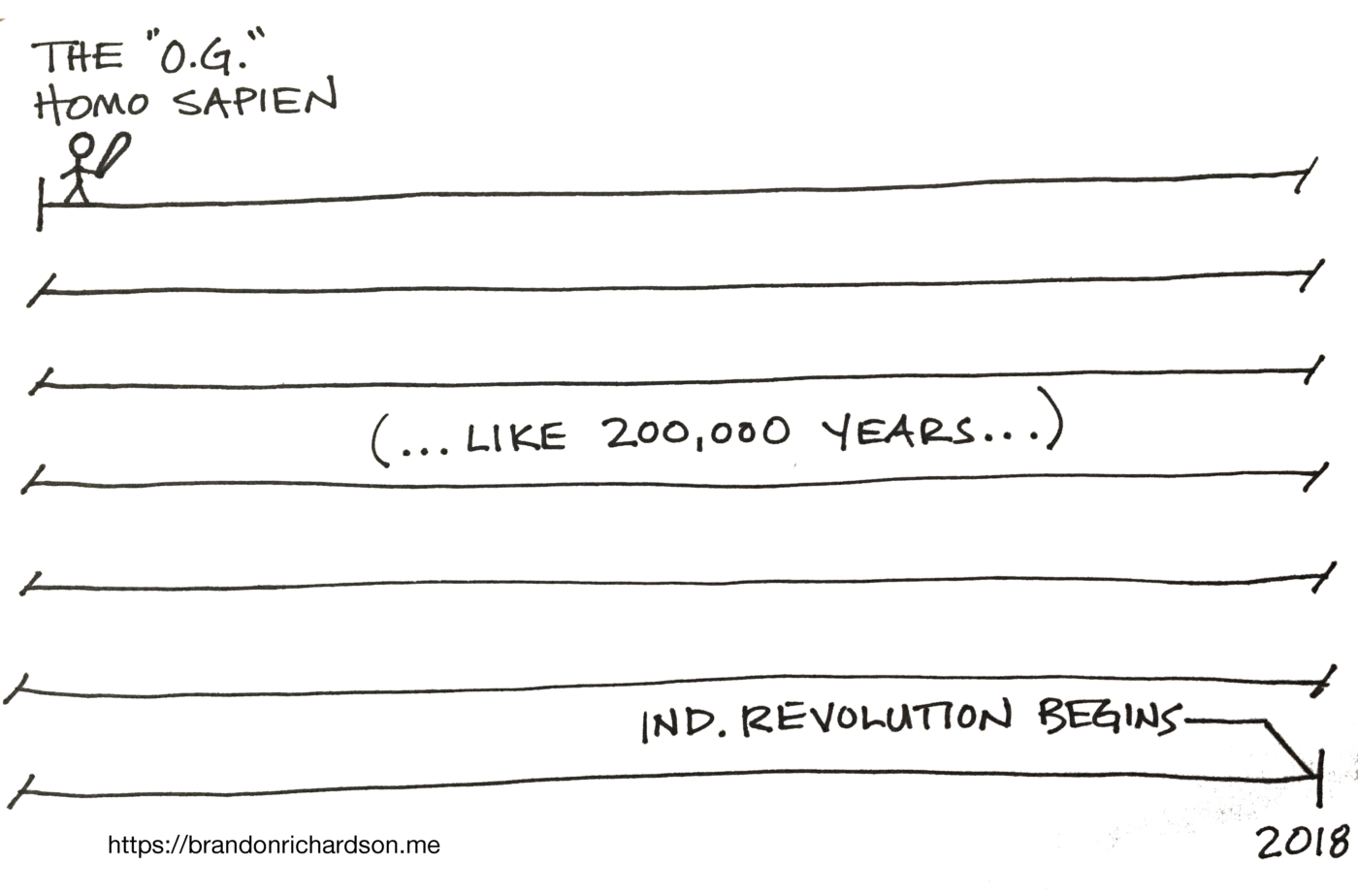These 83 daily habits will make you 1700% more productive!
I hate listicles with click-bait headlines. I despise websites that make me click through 12 pages to read a simple article so they can show me more ads. And I think Buzzfeed should run headfirst into oncoming traffic.
But sometimes, lists are effective.
The world as we know it is changing—fast. These are the 7 things you must do to get ahead in the new economy!
Just kidding.
But I really did make a list of things we can do to help navigate this era of innovation. And since I should practice what I preach, here is the list:
- Stick to your values and priorities
- Be curious
- Read
- Learn new skills
- Talk about your ideas
- Write
- Take breaks
If that’s all you wanted to know, feel free to skip the rest of the article.
The 0.001%-ers
If modern humans (homo sapiens) have been around for 200,000 years, then the 200 years since the Industrial Revolution are a tiny blip on the timeline of human history—0.001%.

Think about all the innovation that has happened in this tiny sliver of time:
- Electricity
- Automobiles
- Airplanes
- Radio and TV
- Computers
- Internet
- Digital music
- Cell phones
Now think about what humans invented in the first 199,800 years:
- Fire
- The wheel
Obviously, I’m exaggerating to make a point. Earlier humans also invented weapons, clothing, languages, and lots of other stuff. But the sheer volume of innovation in the last 200 years is mind-blowing. [I “borrowed” this idea from Tim Urban (@waitbutwhy) in a podcast. Listen here if you’re interested.]
Now, technology and computers are automating tasks once performed by humans—the same tasks that we just invented in the last two centuries. And robots are, in fact, taking our jobs.
But I think this is a good thing.
Think Bigger
With technology replacing mundane tasks, we can think bigger. We can do things on our own that used to require a small army of employees. We can learn new things with the click of a button. We can test ideas anonymously. We can sell our “skills”—knowledge, art, hobbies, special talents—to anyone in the entire world.
I don’t think new technology will lead to higher unemployment. Instead, I think it’s going to lead to new jobs that are much more rewarding and fulfilling. Jobs we haven’t even thought of yet.
The rate of human innovation is only accelerating. And while that may seem overwhelming, there are some things we can do—some practices, habits, routines, or whatever buzzword you want to use—that may help us navigate the next few decades.
And now for my “list.”
Stick to Your Values and Priorities
We should run everything we do through a Priority Filter. (I capitalized that to see if it will catch on and become a common phrase so I can trademark it.)
What’s most important to us? Is it innovation? Spirituality and gratitude? Success, fame, and fortune? Traveling the world? Curing world hunger? Family and friends?
I try to run everything through my own unique filter to make sure it aligns with my values and priorities. When my job started demanding more time than I was willing to sacrifice for my family, I knew I had to make a change. And when new opportunities come my way, I run them through my filter.
This isn’t a hard-and-fast rule—it’s a process. Our filter changes as we go through different stages of life. My priorities as an almost-40-year-old-father are a little different from when I was an almost-30-year-old-kid. And sometimes food and shelter take priority over holding out for the “perfect opportunity.”
But if we’re always mindful of our values and priorities and try to build our lives around them, then we’re winning the battle.
Be Curious
At some point in our lives, we stop asking, “Why?”
It usually happens some time in high school after adults have beaten it into our heads that we need to grow up and figure out where we want to go to college and what we want to do with our lives. Because 14-year olds are uniquely qualified to make such decisions.
One of the coolest things about little kids is how curious they are. They want to know how and why stuff works. They want to test boundaries and see what happens when they push them.
So why not do the same thing as adults? Why not ask questions and try new things? Why not tear things apart to see how they work? That’s how we really learn—by exploring.
If we can regain the curiosity children have, we may discover their source of happiness, too.
Read
Good nonfiction can teach us new things and spark ideas (I have a few recommendations). Good fiction can expand our imaginations and exercise our brains.
It’s all good for us. And if we do it enough, we start regurgitating things we read as if we thought of them ourselves. Which is fine—there’s nothing new under the sun, after all.
Where do you think I get all my ideas from?
Learn New Skills
Develop a growth mindset. Don’t be complacent doing the same thing for the next thirty years. Instead, try new things and learn new skills.
If innovation is booming, then so is the marketplace for new skills. And the more skills we develop—even just a little—the more valuable we are.
Become a “jack of all trades.”
Talk About Your Ideas
Don’t be selfish. Talk about your thoughts, dreams, and aspirations. Share them with anyone who will listen.
You never know who may be able to help you out. And even if the person you’re telling knows nothing about what you’re doing, they may know someone who does.
People love connecting other people.
Write
Write down your thoughts and ideas. Journal for five minutes a day. Start a blog. Just write something.
Even if it’s for your eyes only. Even if no one else ever reads it.
Dumping the thoughts in your head onto paper or a screen makes room for new thoughts. And the process itself actually gives you new thoughts and ideas.
Take Breaks
In a world of constant connection, it’s more important than ever to disconnect.
Take short breaks during the workday and longer breaks every so often. They replenish cognitive energy and help us push through the slumps.
And “taking a break” doesn’t mean surfing Facebook. Instead, go for a walk. Get some exercise. Or read something inspiring and impactful—like this blog.
Be Yourself
I’m an introvert, and I hate conflict. Yet I spent years doing a job that requires daily conflict resolution and outspoken leadership. Let’s just say it did not suit my personality.
I’m going throw up a little in my mouth when I write this—I hate tired expressions—but stop trying to force a square peg into a round hole. As we get older, we know our personal strengths and weaknesses. We know the types of work we enjoy, and we know what makes us miserable. Try to do more of the former and less of the latter.
This doesn’t mean we can’t change. We can work to improve anything about ourselves we want (remember that whole “growth mindset” thing a few sections ago?). But it’s also okay—maybe even smart—to cater to our strengths.
It’s okay to create a life that suits our personalities.
The future doesn’t have to be scary. The most promising innovations are for the benefit of humanity. And while some of the things we’re used to may go away, new doors will open. We just have to look for them.
It’s up to us. No one is going to hold our hand and lead us through the chaos.
Except for robots, maybe.
